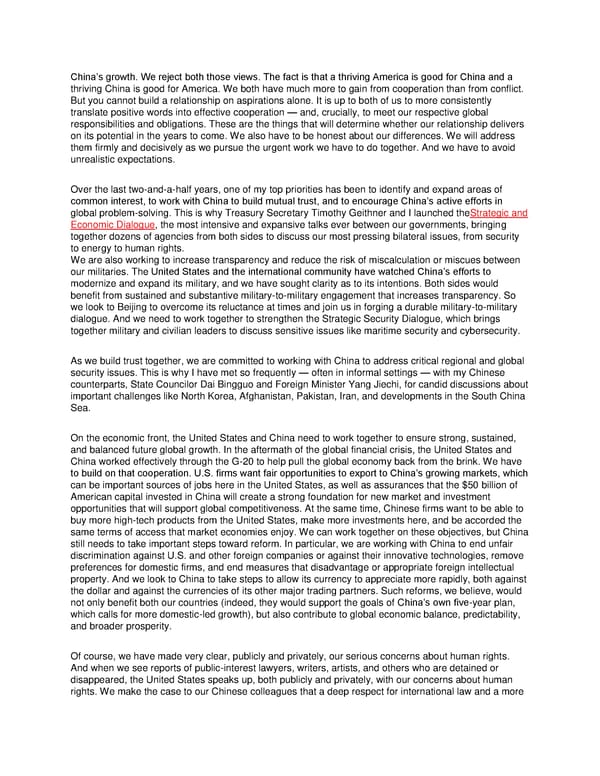China’s growth. We reject both those views. The fact is that a thriving America is good for China and a thriving China is good for America. We both have much more to gain from cooperation than from conflict. But you cannot build a relationship on aspirations alone. It is up to both of us to more consistently translate positive words into effective cooperation — and, crucially, to meet our respective global responsibilities and obligations. These are the things that will determine whether our relationship delivers on its potential in the years to come. We also have to be honest about our differences. We will address them firmly and decisively as we pursue the urgent work we have to do together. And we have to avoid unrealistic expectations. Over the last two-and-a-half years, one of my top priorities has been to identify and expand areas of common interest, to work with China to build mutual trust, and to encourage China’s active efforts in global problem-solving. This is why Treasury Secretary Timothy Geithner and I launched theStrategic and Economic Dialogue, the most intensive and expansive talks ever between our governments, bringing together dozens of agencies from both sides to discuss our most pressing bilateral issues, from security to energy to human rights. We are also working to increase transparency and reduce the risk of miscalculation or miscues between our militaries. The United States and the international community have watched China’s efforts to modernize and expand its military, and we have sought clarity as to its intentions. Both sides would benefit from sustained and substantive military-to-military engagement that increases transparency. So we look to Beijing to overcome its reluctance at times and join us in forging a durable military-to-military dialogue. And we need to work together to strengthen the Strategic Security Dialogue, which brings together military and civilian leaders to discuss sensitive issues like maritime security and cybersecurity. As we build trust together, we are committed to working with China to address critical regional and global security issues. This is why I have met so frequently — often in informal settings — with my Chinese counterparts, State Councilor Dai Bingguo and Foreign Minister Yang Jiechi, for candid discussions about important challenges like North Korea, Afghanistan, Pakistan, Iran, and developments in the South China Sea. On the economic front, the United States and China need to work together to ensure strong, sustained, and balanced future global growth. In the aftermath of the global financial crisis, the United States and China worked effectively through the G-20 to help pull the global economy back from the brink. We have to build on that cooperation. U.S. firms want fair opportunities to export to China’s growing markets, which can be important sources of jobs here in the United States, as well as assurances that the $50 billion of American capital invested in China will create a strong foundation for new market and investment opportunities that will support global competitiveness. At the same time, Chinese firms want to be able to buy more high-tech products from the United States, make more investments here, and be accorded the same terms of access that market economies enjoy. We can work together on these objectives, but China still needs to take important steps toward reform. In particular, we are working with China to end unfair discrimination against U.S. and other foreign companies or against their innovative technologies, remove preferences for domestic firms, and end measures that disadvantage or appropriate foreign intellectual property. And we look to China to take steps to allow its currency to appreciate more rapidly, both against the dollar and against the currencies of its other major trading partners. Such reforms, we believe, would not only benefit both our countries (indeed, they would support the goals of China’s own five-year plan, which calls for more domestic-led growth), but also contribute to global economic balance, predictability, and broader prosperity. Of course, we have made very clear, publicly and privately, our serious concerns about human rights. And when we see reports of public-interest lawyers, writers, artists, and others who are detained or disappeared, the United States speaks up, both publicly and privately, with our concerns about human rights. We make the case to our Chinese colleagues that a deep respect for international law and a more
 HRC America's Pacific Century Page 3 Page 5
HRC America's Pacific Century Page 3 Page 5